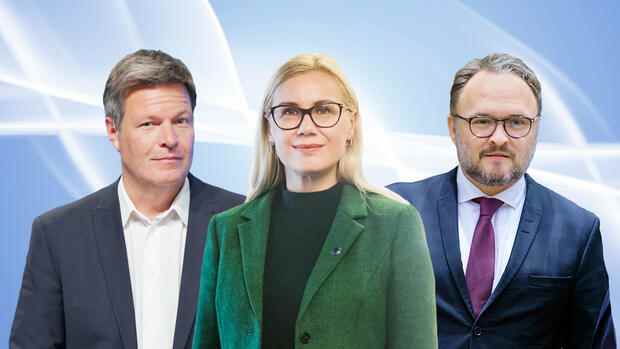Robert Habeck is German Federal Minister for Economic Affairs and Climate Protection, Kadri Simson is EU Commissioner for Energy, Dan Jørgensen is Denmark’s Minister for Climate, Energy and Supply
(Photo: Imago (2), Bloomberg)
Russia uses its energy as a political and economic weapon. This has catapulted the countries bordering the Baltic Sea to the forefront of the international energy crisis.
But we countries in the region are strengthening our energy security, phasing out Russian fossil fuels and planning to increase our offshore wind capacity sevenfold in just eight years. In doing so, we will play a key role in protecting Europe against Russia using its energy as a weapon.
That is why the Energy Security Summit for the Baltic Sea Region took place in Denmark this week, attended by the President of the European Commission, the EU Energy Commissioner, the Prime Ministers, Presidents and Energy Ministers from Germany, Poland, Lithuania, Latvia, Estonia, Finland, Sweden and Denmark .
For centuries, the Baltic Sea has been the backdrop to international conflicts and rivalries. Today, however, our countries are members of the European Union. And we are in the process of significantly strengthening our cooperation on energy issues.
Top jobs of the day
Find the best jobs now and
be notified by email.
The Russian invasion of Ukraine was as shocking as it was unjustified. Russia’s subsequent use of its gas supplies as a political and economic weapon has made it clear that Europe must become independent of Russian energy imports.
Russia is holding back its natural gas exports in flagrant violation of existing agreements, trying to push the EU to the brink of an energy crisis and pressure us not to help Ukraine.
Will Russia’s strategy work?
In the last ten years we have significantly increased cooperation on energy issues. The Baltic Energy Market Interconnection Plan (BEMIP) has been an important building block since 2008.
But this week began a new era for our energy systems when the eight Baltic Sea countries and the European Union came together and signed the “Marienborg Declaration”.
This declaration has four objectives.
The Baltic Sea countries have agreed on these four goals:
First it will accelerate the phase-out of Russian energy. In order to wean ourselves off fossil fuels, we will, among other things, advance the electrification of our energy systems, diversify our energy supply and gradually decarbonize our gas networks.
Secondly we aim to increase our offshore wind energy capacity almost sevenfold over the next eight years. If we expand the current capacity of 2.8 gigawatts to at least 19.6 gigawatts, we could power up to 28.5 million homes. To put this in perspective, this roughly corresponds to the number of all households in Poland, Lithuania, Latvia, Estonia, Finland, Sweden and Denmark.
Third needs Russian energy in some of our countries in the short term replaced by increasing imports of liquefied natural gas (LNG). As LNG is transported by sea, we need to improve coordination to manage the growing maritime trade around the Baltic Sea. This also includes cooperation in the construction of infrastructure such as ports and LNG terminals.
After all we will explore joint cross-border renewable energy projects and identify infrastructure needs to enable the integration of renewable energy needed to ensure security of supply as well as affordable energy for our homes and businesses. Of course, we take into account the national energy policy priorities and the energy mix of the individual countries.
We can end our historic dependence on Russian energy now
Globally, the energy industry has undergone a dramatic but often overlooked transformation over the past decade. For example, the global average price of offshore wind energy has fallen by 60 percent since 2010, making it cheaper than most fossil fuels today.
In addition, an increase in domestic energy production capacities will allow us to produce green hydrogen, which can gradually be used as an alternative to Russian gas.
The geopolitical situation in the energy sector is changing rapidly. The Russian invasion of Ukraine has sent geopolitical shockwaves through Brussels, all other European capitals and Washington, DC.
Energy has often been used as a weapon against Europe. But we can use the falling cost of renewables and LNG and the advent of the hydrogen economy as a shield.
At this pivotal moment, we have a unique opportunity to end our historic dependence on Russian energy and take charge of our energy future. In this way we can show the world that energy should never be used as a tool of oppression, but as a source of cooperation and prosperity.
The authors:
Robert Habeck is the German Federal Minister for Economic Affairs and Climate Protection, Kadri Simson is EU Commissioner for Energy, Dan Jorgensen is Denmark’s Minister for Climate, Energy and Utilities
Also signing this comment: Khashayar Farmanbar (Minister of Energy and Digital Development of Sweden), Riina Sikkut (Minister of Economy and Infrastructure of Estonia), Anna Moskwa (Minister of Climate and Environment of Poland), Ilze Indriksone (Minister of Economy of Latvia), Mika Lintilä (Minister of Economy). of Finland) and Dainius Kreivys (Minister of Energy of Lithuania).
